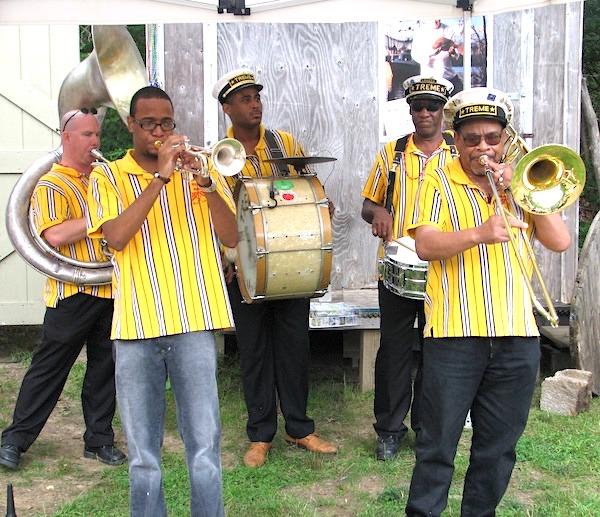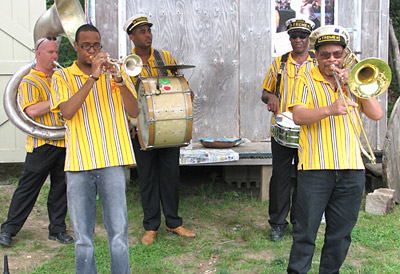Treme Brass Band

Bio
The Treme neighborhood, on the outskirts of the French Quarter, was the birthplace and home of many generations of New Orleans's finest jazz musicians. Central to that tradition are the parade bands that play for traditional funerals, street parades, and family celebrations. Benny Jones, Sr., a 50-year brass band veteran and son of noted musician Chester Jones, founded the Treme Brass Band over 15 years ago, following his role as a drummer with the Olympia Brass Band and a leader of the Dirty Dozen and Chosen Few Brass Bands.
Although they are known internationally through their recordings and tours, the Treme Brass Band is still firmly rooted in the New Orleans street band tradition. They have performed at the National Folk Festival and for the American Roots 4th of July Celebration on the National Mall. Many veterans of Treme have gone on to found other bands, including the Rebirth, New Birth, and Little Rascal Bands.

Interview with Mary Eckstein
NEA: I want to congratulate you and the Treme Brass Band on your award. How did you feel when you heard the news?
MR. JONES: I felt real great about it. It's a great honor to receive something like this.
NEA: Tell me some of your earliest memories of drumming and why you were attracted to that music?
MR. JONES: I started playing on pots and pans around the house because I always was surrounded by musicians. My father, Chester Robert Jones, was a drummer. He played with all the old bands, bands like the Eureka Brass Band and the Allman Brass Band. He played at Preservation Hall. My oldest brother was a drummer with a band on Bourbon Street for many years. I was born and raised in the Treme area, a neighborhood that had lots of musicians, drummers. That's where I got my influences, from my father and my brother and all the musicians around me.
NEA: Was the music you play unique to that neighborhood or was it found throughout New Orleans?
MR. JONES: In that neighborhood, back in the '50s and the '60s, you had jazz funerals and parades always passing by. There were a bunch of social and pleasure clubs in that neighborhood, in the Old Caledonia, at a club called the Square Deal, and so on. My father and a bunch of old musicians played a lot jazz funerals - when someone in a club died they always wanted a jazz funeral. On the weekends they might play for a parade. Social and pleasure clubs have annual parades every year and his band would perform. I was very inspired by that.
NEA: And how old were you when you started drumming?
MR. JONES: I was around about 12,14 years old.
NEA: Was it easy for you to learn?
MR. JONES: It was a lot easier for me because I would always go around to see the music so I could find out what was going on. I paid a lot of attention, trying to learn different kind of beats on the drums. I would sit around and watch the old guys play the drums and then go home and practice stuff on the drums.
I started off playing the bass drum. Nowadays, I play the bass drum on some gigs and the snares on others.
I started off in the music business as a Grand Marshall with the Olympia Brass Band. Then I played snare drum with a second band while still playing bass drum with the Olympia Brass Band. Then I married into the Batiste family, who had a band called the Dirty Dozen Kazoo Band, but I broke off from that band and started the Dirty Dozen Brass Band. That was way back in the late '70s, early '80s. I played bass drum for the Dirty Dozen Brass Band.
NEA: How many members are there in the Treme Brass Band?
MR. JONES: It depends on the gig. Usually we perform with eight or ten members. Sometimes I'll do a convention where I have to move 500, 600, sometimes 1,000 people from the convention center to a hotel. For something like that I'll put a big band together with 10, 12, maybe 15 members. But normally I travel with an eight or ten piece band.
NEA: Could you explain the difference between a street parade and a jazz funeral?
MR. JONES: For a traditional jazz funeral we play hymns and the dirges during the funeral procession. That's what you play when you leave the funeral parlor or the church. Songs like "The Old Rugged Cross," "What a Friend We Have in Jesus," "Sweet By and By," and "Precious Lord." Church music. That's what you play when you bring the body to the graveyard, until you get ready to cut the body loose. After the deceased is buried, depending on how far they have to march, we come back playing a little up tempo music.
When you're doing a parade, or a gig for a social and pleasure club, you play up tempo music. "When the Saints Go Marching In." "Second Line." "Mardis Gras New Orleans." Those kind of tunes. Real up tempo tunes you can dance to all day long.
Two different events. Two separate kinds of music.
NEA: Have the jazz funerals changed over time or have they stayed pretty consistent?
MR. JONES: They have changed. There are younger bands playing modern music for jazz funerals rather than the traditional hymns and dirges. When the young people have a jazz funeral they don't want sad music. They want up tempo music. They want fast music. But we continue to play the traditional music. I tell people, "If you've got young people and you want a young band, hire a young band. If you want to hire my band, we're going to play the old, traditional music on the street." I'm a traditional musician and I want to try to keep the traditional jazz funerals going in New Orleans.
NEA: How did Hurricane Katrina affect your band?
MR. JONES: My whole band had to leave and got scattered around the country. Everybody was living in different areas. I had band members in Mississippi, Alabama, Baton Rouge. Most of the musicians in my band had their houses damaged. I had to leave myself.
NEA: Where did you go?
MR. JONES: From here I went to Baton Rouge, then to Lafayette. From Lafayette to Dallas. Then I wound up in Arizona.
NEA: Why Arizona?
MR. JONES: When I was in Dallas, a guy named Bob Teller called to see whether I was putting my band together and if we could play in Arizona. I put a contact number on a website to find out where all my band members were and what had happened to them, and began piecing my band together one or two at a time. I told him, "Now, we don't have instruments, so we need you to help us get instruments and some clothes to work with." After I'd finally made contact with all the band members, he flew some of them to Arizona and arranged for others to be driven. We stayed up there for about three or four months getting instruments and everything we needed and getting gigs.
NEA: So you were able to get everybody back together in Arizona?
MR. JONES: The majority of them. One or two couldn't make it because they had other obligations. They had to take care of their families and other things.
NEA: Are most of them back in New Orleans now?
MR. JONES: One or two are still up in Arizona. But the majority are back home.
NEA: How has the hurricane affected the music scene in New Orleans?
MR. JONES: A lot of musicians are gone. And many of the clubs we play had to close down because so few people were coming to town, or they had to do renovations. Then when they started hiring cats to play, they had to pay a percentage of the door rather than a guaranteed fee. Before the storm we worked for a straight salary. It's harder that way, but that's the way it is.
Thank god they got a couple of little foundations helping musicians, trying to help us get our houses repaired and distributing food and clothes, and so on. The Krewe of Araby and the Tipitina Foundation are working with us to help us fix our houses. Preservation Hall Foundation, Common Ground, and other organizations are helping musicians.
I've been living in a trailer next door to my house and working on the house while trying to get a couple of jobs playing music to make ends meet. I'm trying to get materials to do some renovations on the house.
NEA: What advice do you have for young students trying to learn the drum or percussion instruments?
MR. JONES: Number one: if you're going to be a musician and join anybody's band, you must always show up on time. Number two: find out the uniform that you're going to wear on the gig. Number three: before you start playing a gig, make sure you tune up your drum or your instrument, whatever instrument you're playing. Always tune it up before you start playing.
NEA: What does it take to keep a career like yours going?
MR. JONES: I perform with other brass bands on different occasions. I play the snare drum or bass drum. I play with the Storyville Stompers. I played for Mr. Greg Stafford's Young Tuxedo Brass Band, a traditional band. I do some gigs with New Birth Brass Band playing both modern and traditional music. I perform every so often with Dirty Dozen Brass Band and the Olympia Brass Band. I also perform at Donna's Bar and Grill every Friday night -- I've been there for the last 12 or 14 years. I also perform at Preservation Hall [now closed for renovations]. I perform down at the Candlelight Club when they have birthday parties and different events. I perform at the Wisdon club and also at Sweet Lorraine. I perform at Tipitina's uptown and every now and then at Snug Harbor and Café Brazil. And I do a gig at the Spotted Cat on Frenchman's Street.
NEA: You certainly keep busy. You must really enjoy playing music.
MR. JONES: Yes, I do. That's what keeps me going. That's what I live for. I'm semi-retired from driving trucks -- I do music for a living now. I love making people happy and I love working with the kids. I'm always trying to teach kids how to play the bass drum or the snare drum to try to keep the tradition going. The children are our future.

